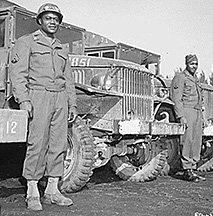 On July 26, 1948, President Harry S Truman issued Executive Order 9981 which abolished racial discrimination in the United States Armed Forces. But as was the case with schools several years later, desegregation moved at a snail’s pace. For the first half of the Korean War, troops remained largely segregated by race. By the end of the war, the military was largely desegregated.
On July 26, 1948, President Harry S Truman issued Executive Order 9981 which abolished racial discrimination in the United States Armed Forces. But as was the case with schools several years later, desegregation moved at a snail’s pace. For the first half of the Korean War, troops remained largely segregated by race. By the end of the war, the military was largely desegregated.
Connor Huff, an assistant professor of political science at Rice University in Houston, and Robert Schub, an assistant professor of political science at the University of Nebraska-Lincoln, conducted a study to see if racial segregation in the U.S. military impacted death rates among the troops during the Korean War.
Researchers found that Black and White soldiers’ fatality rates were similar, regardless of whether they were serving in segregated or integrated units.
“Throughout much of the Korean War, the U.S. military was underprepared and undermanned,” Dr. Huff explains. “Military commanders were putting soldiers where they were most necessary, and the need for battlefield contributions seems to have overridden any of the discriminatory behavior that could have led to different fatality rates between White and Black soldiers.”
The full study, “Segregation, Integration, and Death: Evidence From the Korean War,” was published on the website of the journal International Organization. It may be accessed here.










